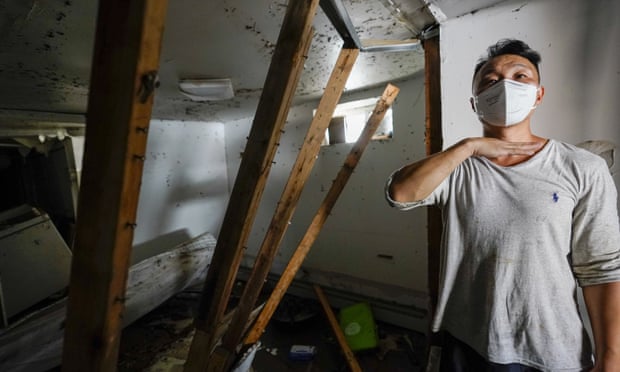
Most people killed in New York City in a record-breaking storm this week lived in basement apartments. Walls of water crashed into their homes, trapping them inside and blocking efforts to help.
Of 13 people known to have died in the city, 11 were living in such apartments, including a two-year-old boy who died with his parents.
For decades, affordable housing advocates have campaigned to improve the safety of basement apartments, which are often illegal but can be vital for low-income New Yorkers seeking affordable housing.
Annetta Seecharran, executive director at Chhaya, a nonprofit which founded the Basement Apartments Safe for Everyone (Base) campaign in 2008, said the city should have a plan to induce landlords to bring such homes into line with building codes.
“With climate change, we’re going to see these types of floods and storms more frequently,” Seecharran said. “So are we going to wait for another disaster to act?”
There is no official count of basement apartments in New York but the mayor, Bill de Blasio, said the city estimated there were 50,000, or possibly “substantially more”. In 2009, according to a study by the Pratt Center for Community Development and Chhaya, there were an estimated 114,000 basement apartment units.
As with the Covid-19 pandemic, Seecharran said, the people most at risk in the storm were the immigrants, people with low incomes and people of color who make up the majority of basement apartment residents.
“Even if your basement wasn’t impacted, you are scared, wondering: ‘Am I going to be next,’” Seecharran said.
The majority of deaths occurred in Queens, an enclave for immigrant communities.
A two-year-old boy whom people called Ang and his mother, Mingma Sherpa, and father, Lobsang Lama, were found dead in a basement apartment. Yue Lian Chen, 86, died in her basement apartment. Darlene Hsu, 48, was found unconscious in a Queens basement apartment and pronounced dead at the hospital.
A mother and son, Phamatee Ramskriet, 43, and Khrishah Ramskriet, 22, were found unconscious by divers in another building in Queens where a wall caved in, filling the basement with water. The son died at the scene. His mother was pronounced dead at the hospital.
The divers were able to save the 39-year-old son of the building owner, Ragenbra Shivprafab, who tried to rescue the family.
“These cops were giving their lives to get them,” Shivprafab told the New York Daily News. “My son was scrambling to get down. He was already in, trying to get them, and the cops pulled him out. He would have died too.”
Three unidentified victims, two women and a man, were found in a Queens basement apartment on Thursday and pronounced dead at the scene.

In Brooklyn, Roberto Bravo, 66, was found dead by police responding to a call about flooding. Pablo Bravo said his brother survived being hospitalized with Covid-19 for weeks last year and was temporarily living in the building he owned.
“We’re the story of foreigners, immigrants, come here to make it, live a decent life,” Bravo told the Associated Press. “Basically, we came here not only to grow ourselves, but also to contribute and grow the country.”
In a press briefing on Friday, De Blasio sketched a rough outline of plans to address risks in basement dwellings, including ordering door-to-door evacuation warnings and improving the city’s mobile alert system.
In one hour on Wednesday, 3.15in of rain fell in Central Park. The previous record, 1.94in, and was set last month.
De Blasio acknowledged that response efforts to help people in basement apartments could be complicated by language barriers and distrust of the government, especially for undocumented migrants. The city, De Blasio said, planned to work with community groups that might act as “trusted messengers in all appropriate languages”.
“We are building the plane as we go down the runway in this case,” said De Blasio.
Seecharran said the plans outlined on Friday were “absolutely unrealistic” because basement apartments are not on the mainstream market, making it inherently difficult to identify them and alerttenants in any emergency.
To legally rent out a basement apartment, a landlord must get a certificate of occupancy and the space must meet safety requirements, including having a window or door that can open to the outside and be used to exit the space. Ceilings must be at least 7.5ft high.
Many basement apartments do not meet those requirements, which can be costly for small landlords.
In 2019, a pilot program sought to find ways to legalize basement apartments, but $1.09m in funding was redirected in 2020 to the Covid-19 response.
Campaigners had been seeking such a program for decades.
Seecharran said: “We have been facing a housing crisis for a very long time now and we’ve done nothing to bring more units that are safe and affordable online.”